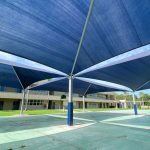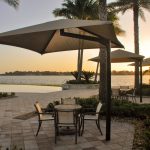Shade for Green Parking Lots
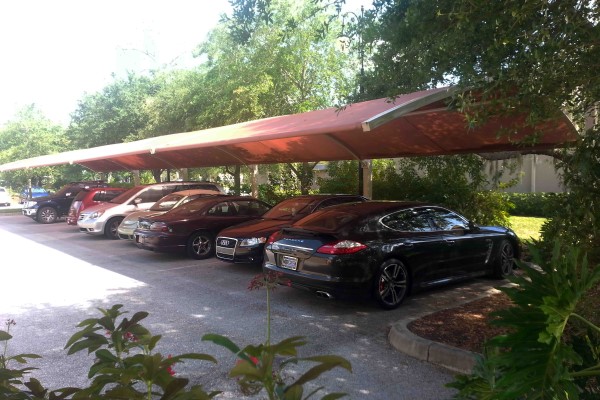
Environmental & Economical Benefits of Shade Structures:
- Clean Energy Solution
- Abate Urban Heat Island Effect
- Immediate & Low Maintenance
- Improves Curb Appeal & Comfort
- Reduces Energy Consumption
According to the Green Laws Research Project conducted by landscape architect Buck Abbey, parking lots are America’s most often used outdoor space and, unfortunately, most have harmful effects on people, animals and the environment. The solution is green parking lots.
In Buck’s words:
Greening a parking lot transforms a hot, dusty, dirty layer of paving that has been striped to temporarily store automobiles into a more wholesome urban forest setting.
The US Environmental Protection Agency (EPA) and LSU School of Landscape Architecture define greening as providing “ecosystem services.” Rather than the exposed, oily concrete slabs of conventional parking lots that result in heat islands and toxic runoff, green parking lots shading contain trees and other vegetation that manage stormwater, preserve soil, filter the air, produce oxygen and provide shade.
The Power of Shade
Shade breaks up the expanses of concrete and asphalt that hold and radiate heat. This abates the “urban heat island” effect that happens when buildings, roads, parking lots and other infrastructure absorb and re-emit the sun’s heat. This can cause temperatures in these areas to be up to 7 degrees warmer during the day and 5 degrees warmer at night. The increased heat also increases the amount of energy used to cool buildings, vehicles and people, and it leads to air and water quality issues.
Many communities, such as Montgomery County, Maryland and the cities of Fresno, New Orleans and Miami are enacting landscape codes that require parking lot shading. These codes are evidence that communities see more shade in the city as an environmental benefit. And according to Buck’s study, lowering temperatures with shade also reduces the volatile organic compounds (VOCs) that are released from vehicles stored in the sun.
Sunshades from Apollo Sunguard
Overhead shading structures can be used to enhance existing tree canopies and to provide supplemental shade while trees mature. Although trees provide many other benefits, the most effective way to ensure parking lot shade is with pre-engineered fabric shade structures, such as those produced by Apollo Sunguard in Sarasota, Florida.
Apollo Sunguard shades are made with a high-density, breathable fabric that offers 70 percent to 95 percent shade and 91 percent to 96 percent UV block. The variation depends on the color of the fabric selected. Designed to mimic the natural canopy of trees, Apollo Sunguard shade structures allow air circulation and reduce temperatures underneath by up to 20 degrees.
According the Buck, shade structures like those from Apollo Sunguard can keep car interiors up to 100 degrees cooler than those parked in an open lot. This results in less VOCs released, less deterioration of the vehicle and less energy needed to cool vehicles and people.
Green Building Programs
Two green building programs, LEED™ (Leadership in Energy and Environmental Design) and SITES™ (Sustainable Sites Initiative) have been created over the last decade to put criteria around the design of green buildings and green building sites, both of which include parking lots. LEED v4.1 and SITES v2 both provide “credits” based on guidelines and benchmarks for the degree of sustainability of the building or site. Levels of sustainability include Certified, Silver, Gold or Platinum levels.
According to Buck, using fabric structures to earn sustainability credits under LEED v4.1 or SITES v2 is practical and “perhaps one of the best ways to shade pavements” and “one of the major distinctions of a green parking lot.”
Apollo Sunguard offers cantilevered shade structures designed specifically for parking lots. These shades have large canopies for full-coverage parking shade with no side posts between spaces that would impede parking. The specially treated, UV-blocking polyethylene shade fabric used by Apollo Sunguard is mold, mildew, fire and wind resistant and designed to have a long lifespan. When replacement is needed, it is quick and easy to change the shades and the used fabric can be recycled.
 Planning Perfect Shade
Planning Perfect Shade
Parking lot shade structures work best if planned in tandem with the planting features of the lot. Trees and shades can work together to shade the lot throughout the day as the angle of the sun changes. Shade structures can also be equipped with lighting systems, surveillance devices, solar panels and EV charging stations.
Shade is especially important for parking lots that feature electric vehicle charging stations. When EV charging stations are shaded, they:
- Charge vehicles up to 14 minutes faster
- Consume less KW energy to charge
- Require less maintenance for the charging station
- Protect the vehicles from internal and external sun damage
- Lower internal vehicle temperatures up to 20 degrees
Work with Apollo Sunguard
Apollo Sunguard’s professional shade designers can work with you to design the perfect for your green parking lot shading or other green building project. Contact us at 941-925-3000 or at [email protected].


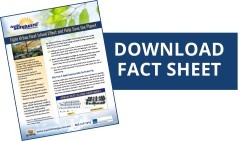
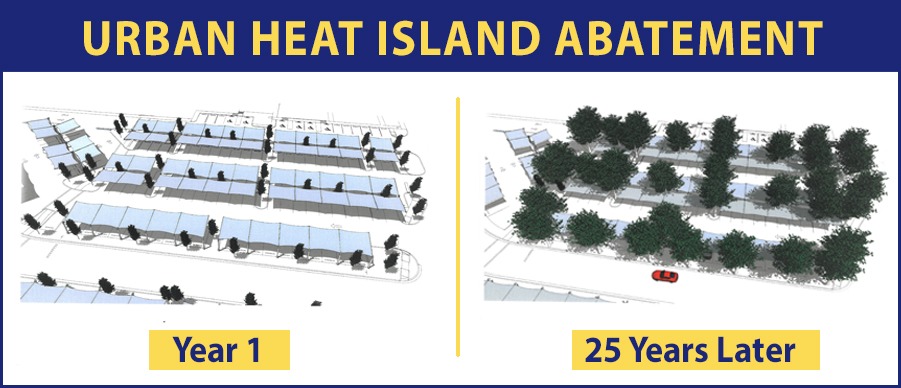
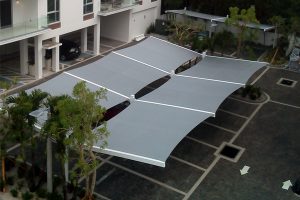 Planning Perfect Shade
Planning Perfect Shade



